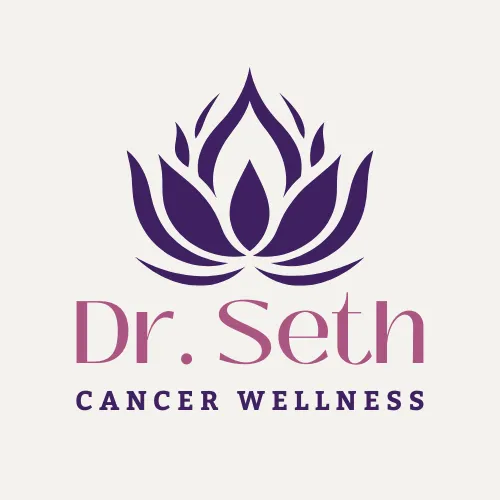
Compassionate Emotional Support
- A cancer diagnosis can feel overwhelming—we walk with you.
- Personalized coping strategies and safe, supportive space.
Empower yourself to overcome side effects, reclaim vitality, and flourish through every stage with a holistic, functional approach.

Dr. Seth Wellness • Holistic Cancer Wellness
Evidence‑informed, functional support to reduce side effects, restore vitality, and help you flourish at every stage.
Protocols to ease neuropathy, nausea, brain fog, and more.
Restore circadian rhythm and cellular vitality.
Rebuild microbiome health to support resilience.




Begin your transformative journey to optimal health with Dr. Seth Cancer Wellness — your trusted guide in Functional Wellness.
Clear steps, compassionate care, and a plan that helps you move confidently beyond cancer.
Discuss your goals and challenges and see if our holistic approach is the right fit for your journey.
Book your call →Comprehensive functional assessment to create a personalized care plan aligned with your treatment stage.
Schedule now →Ongoing support, plan adjustments, and lifestyle coaching to keep progress steady and visible.
Manage follow‑ups →Tailored meal planning and supplement strategies to support healing and reduce inflammation.
Start free 10‑day course →Stress, sleep, movement, and gut‑health strategies to strengthen resilience and energy.
Explore the curriculum →Consistent access to expert guidance between sessions—so you always know your next best step.
Book a check‑in →Hi, I’m Dr. Seth Asare, and I’m here to help you take back control of your health, your body, and your life. I empower cancer patients and people with chronic conditions to embrace a holistic, functional approach that nurtures the body, mind, and spirit.
With a passion for science-backed, personalized care, I guide my clients on a transformative journey toward renewed health and emotional strength. Together, we address root causes, optimize your body’s natural healing abilities, and craft a plan tailored to your unique needs.
My approach blends functional medicine, nutrition, detoxification, mind-body practices, and emotional resilience tools to help you thrive—not just survive.



Our consultations are designed to provide a comprehensive and personalized approach to your health. During your initial consultation, Dr. Seth conducts a thorough assessment—health history, lifestyle evaluation, and functional medicine review—to understand the full picture.
From there, we co-create a customized plan to address your specific needs and goals. Follow-up visits provide ongoing support, smart adjustments, and guidance to keep you progressing toward wellness with clarity and confidence.
Book a ConsultationI provide a personalized, science- health solutions tailored to your unique body and lifestyle. By listening to your concerns, conducting comprehensive assessments, and creating a customized plan. I empower you to take clear, actionable steps toward feeling better, faster.

Copyright 2026. Dr. Seth Cancer Wellness. All Rights Reserved.